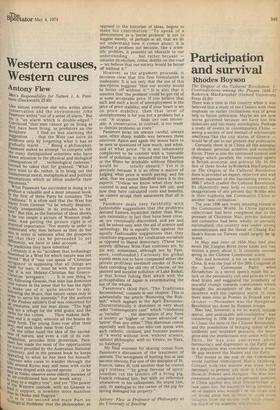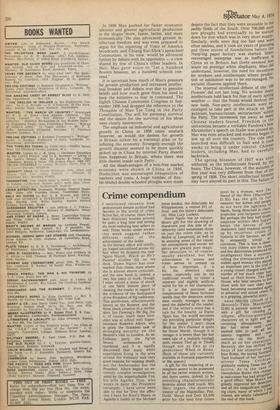Participation and survival
Rhodes Boyson
The Origins of the 'Cultural Revolution: I: Contradictions among the People 1956-57 Roderick MacFarquhar (Oxford University Press £5.50)
There was a time in this country when it was believed that a study of the Classics with their emphasis on earlier civilisations was of great help to future politicians. Maybe we are now worse governed because we have too few classicists and too many sociologists. Perhaps a study of events in contemporary China — seeing a society of size instead of microscopic smallness like the city states of Greece — would be of use to our present-day politicians.
Certainly there is in China all the interplay of idealism, personal ambition and economic forces. There is also the continued turmoil and change which parallels the continued upsets in British economic and political life. In the first of three books byRoderick MacFarquhar on The Origins of the Cultural Revolution there is provided an expert, objective and well written exposure of the fascinating events of 1956-7 which cradled the Cultural Revolution. Its objectivity may help to contradict the exaggerations of any present day Webbs who in their euphoria see Communist China as another 'new civilisation.'
The year 1956 saw many amazing events in the Communist World. In China agrarian collectivism had been completed due to the pressure of Chairman Mao, private industry and commerce had been wholly or partially nationalised, the country was under strong administration and the threat of Chiang KaiShek's forces on Taiwan could largely be ignored.
In May and June of 1956 Mao had also swum theyangtse River three times and had written a poem about it. It certainly seemed spring in the Chinese Communist world.
Mao had however, a lot to watch outside China. It was the year of the 20th Congress of the Soviet Communist Party, when Khrushchev in a secret speech made his attack on the personality cult and policies of the dead Stalin and suggested the possibility of peaceful change towards communism which brought the acceptance of the idea of coexistence with the capitalist world. In June there were riots at Poznan in Poland and in October — November was the Hungarian Revolution put down by Russian troops.
Mao had, however, a lot to watch outside appeal, and unshakable self-confidence" was considering in 1956 the position of the Party in China, the aims of the Chinese Revolution, and the possibilities of bringing many of the landlords and wealthier peasants, the bourgeois and the intellectuals into union with the Party. He was also concerned about bureaucracy and dogmatism in the Party and as a popularist was concerned about a possible gap between the Masses and the Party.
The events in the rest of the Communist world further stimulated Mao's thinking. Contact with the masses was even more necessary to prevent any riots in China like those, in Poland and Hungary. He was also concerned to safeguard his personal position in China against any local Khruschevian attack upon him. He wished to bring forward a set of leaders who wouldn't be his rivals and yet would allow him to retire to think more thoughts from the second rank while retaining much of his standing and control.
In 1956 Mao pushed for faster economic advance and greater agricultural production in the slogan "more, faster, better, and more economically." He also advocated greater intellectual freedom and was even prepared to argue for the reporting of Voice of America broadcasts and Chiang Kai-Shek's speeches! Communism, in his view, would be advanced further by debate with its opponents — a view shared by few of China's other leaders. In May, Mao gave voice to "Let a hundred flowers blossom, let a hundred schools contend."
It is uncertain how much of Mao's pressure for greater production and increased intellectual freedom and debate was due to genuine beliefs and how much grew from his need to keep the initiative to stay in command. The Eighth Chinese Communist Congress in September 1956 had dropped the reference to the Thoughts of Mao Tse Tung in the Party Constitution. The will for personal survival and the desire for the survival of his ideas were clearly interwoven.
The emphasis on industrial and agricultural growth in China in 1956 came unstuck however, as would the dashes for growth in Britain either by a national plan or by inflating the economy. Strangely enough the growth disaster seemed to be more quickly picked up in China by internal Party dissent than happened in Britain, where there was little dissent inside each Party.
All the disadvantages of a non-free market economy were shown in China in 1956. Production was encouraged irrespective of markets and costs. A huge number of double-bladed double-wheeled ploughs were made
despite the fact that they were unusable in the paddy fields of the South. Over 700,000 such
new ploughs had eventually to be melted down for iron which was in very short supplY. Similarly, wells were dug too fast and were
often useless, and it took six years of planning and three moves of foundations before the Nanp'ing paper factory was started. State: encouraged enterprise was as inefficient In China as in Britain but there seemed less waste on prestige white elephants. Mao Md understand, however, the need for incentives for workers and intellectuals where production or assistance was to be encouraged. No socialist illusions applied there. The internal intellectual debate of the '10° Flowers' did not last long. No wonder manY intellectuals held back for fear of early spring weather — that the frosts would destroy the new buds. Non-party intellectuals were en" couraged to take part in the attack on lectivism, bureaucratism, sectarianism' within the Party. The movement ran away as mallY Chinese leaders feared. Freedom in the universities became a veritable Pandora's boX• Khrushchev's speech on Stalin was pinned uP, Mao was even attacked and students began to link up all over the country. The tide once launched was difficult to halt and it took weeks to bring it under control. Chinese leaders, including Mao, had to carefullY backtrack. The spring blossom of 1957 was soon withered, as the intellectuals feared, by the, frosts. The China, however, of the autumn that year was very different from that of the, spring of 1956. The short intellectual fermetne may have played its part in this. The failure °I the freedom to let a hundred flowers blossom among the intellectuals and students may have prejudiced Mao against the intellectuals and moved him to support rural educational Plans which would be a different path of development from Russia. His new schemes Might eventually delay the full industrialisation of China by forty years to the advantage of the West. It is fascinating in this book to read of the manoeuvres of the leading politicians (and even press) through the rapid changes of PMicy. Communist leaders rose and fell in their precedence-ranking in the Politburo according to their ability to ride the tide of Change. Chou had an "unwillingness to elevate policy into principle and go to the wall When a confession of error could allow him to continue in office." Speeches, including those of Mao, were retrospectively doctored and games of semantics played by all groups. It Was even suggested by Lin Shao-ch'i that 'anion and party workers should participate in strikes to retain the workers' sympathy. It is as difficult to follow the machinations of the kommunist Party machine in China as it is in zritain. Policy changes in China were made within thO Party Machine and the Party Leaders had to jump at the right time to stay in power or stay alive. Policy changes in the West, and ipertainly Britain, are also made within the arty machines and any retrospective analysis of the speeches of the Labour Party leaders on trade unions, incomes policy and Europe and °r1 the Conservative Party speeches on incomes policy, prices and the size of governtfletent would show many changes of tack. A BW more apologies for changes of policy in ntain, without going to the length of the confessions of the Chinese, might endear the 1,391iticians a little more to the electorate. !/1a..o's emphasis on the close link of party Policy with the views of the masses might also ,11 elg come amiss after the history of the last Years. Perhaps two-party politics which „ can you fall temporarily from power after i,n;-1r mistakes, and not permanently from all uence, may not concentrate the mind as ultich
as Chinese politics. This would be a pity fnce for the Parliamentary democracies to rvive they must think straighter than the 'Durnmunist countries.
jRhodes Boyson is Conservative MP for eht North.




































 Previous page
Previous page